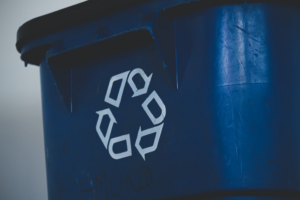APPLICATIONS OF TECHNOLOGY:
- Recyclable thermosetting plastics with high thermal and chemical tolerance
BENEFITS:
Upcycled plastics with:
- an increase in toughness;
- a reduction in creep deformation at temperatures relevant to use;
- and high-temperature structural stability compared to the parent material
BACKGROUND:
Polyolefins are hydrocarbon polymers that account for more than 50% of global plastic production. However, less than 10% of polyolefins are currently recycled. Mechanical recycling of branched polyolefins, such as isotactic polypropylene and (linear) low density polyethylene, is rarely practiced due to a decrease in desired material properties caused by uncontrolled long-chain branching and chain scission reactions.
To reduce the impact of chain scission reactions on material performance, the placement of weak bonds that undergo dynamic exchange reactions into polymers has emerged as a potential solution. Specifically, polymer networks whose crosslinks undergo reversible exchange reactions have been proposed as versatile replacements for many difficult-to-recycle thermoplastics and thermosets. In particular, polydiketoenamine (PDK) dynamic covalent networks have emerged as a versatile class of materials whose chemistry can be tailored to access a range of properties, while remaining mechanically reprocessable and chemically recyclable.
TECHNOLOGY OVERVIEW:
Scientists at Berkeley Lab have developed branched polyolefins and post-consumer polyethylene that are recyclable by modifying them with dynamic diketoenamine functional groups. The modified polyolefins are composed of diketoenamine-rich microdomains phase- separated between polyolefin crystallites; the combination of dynamic covalent crosslinks and microphase separation results in useful material properties. The modified polyolefin displayed an increase in toughness, a reduction in creep (applied strain) deformation at temperatures relevant to use, and high-temperature structural stability compared to the parent polyolefin. The diketoenamine crosslinks also enable iterative reprocessing of the polyolefin with little cycle-to-cycle property fade.
DEVELOPMENT STAGE:
Proven principle
PRINCIPAL INVESTIGATORS:
Frank Leibfarth
Brett Helms
Eliza Neidhart
Mutian Hua
IP Status:
Patent pending
Additional information:
https://pubs.acs.org/doi/full/10.1021/jacs.3c08682
OPPORTUNITIES:
Available for licensing or collaborative research
